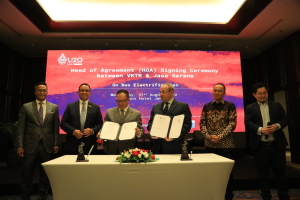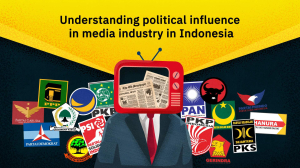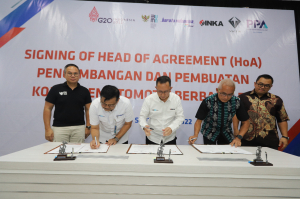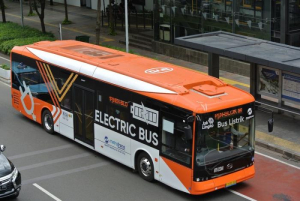VKTR to go public by end of November 2022
PT Vektr Teknologi Mobilitas (VKTR), a PT Bakrie and Brothers Tbk (Bakrie Group) electric vehicle (EV) company, will do an Initial Public Offering (IPO) later in 2022.
VKTR Chairman Anindya Bakrie announced that the company planned to go public on the Indonesian Stock Exchange (IDX) by the end of November 2022. However, he refused to provide details about the plan.
"Later, it is still in the process at the OJK [the Financial Services Authority]," he told Indonesia Business Post on August 31, 2022.
According to local media reports, the company plans to raise between US$ 54 million and US$ 100 million. Bakrie & Brothers' Head of Corporate Communications, Bayu Nimpuno, said the funds raised from the IPO would be used for business expansion.
VKTR plans to develop an electric vehicle ecosystem rather than just electric buses. Underwriters for the IPO will be Ciptadana Sekuritas Asia and Samuel Sekuritas of Indonesia.
Founded in 1942, the Bakrie Group conglomerate includes coal, palm oil plantations, property, manufacturing and infrastructure companies. The most notable figures of the company is Aburizal Bakrie, former Coordinating Minister for the Economy and former Chairman of the Golkar Party.
Meanwhile, VKTR is a spin-off company of Bakrie Autoparts, an automotive component manufacturer that has been in business for over 40 years. The current focus of VKTR is the development of batteries and the electrification of transportation.
"VKTR plans to manufacture not only battery-powered buses but also electric vehicles and the infrastructure required to support them," said VKTR Chief Executive Officer Gilarsi W. Setijono.
Read also: VKTR to provide West Java public transportation firm with electric buses
The electrical battery ecosystem includes electric vehicles, charging stations and batteries. It consists of a digital ecosystem for bus fleets, vehicle owners, drivers, bus operators, taxis, charging stations, workshops, and a payment gateway that connects all payment methods to related transactions. Over several phases, the entire EV ecosystem will receive an investment of US$5 billion. Most manufacturing facilities for EV components will be located in Indonesia, with each cluster having its development phase based on its needs.
For this mammoth project, VKTR has signed strategic cooperation with the world leading EV manufacturer BYD Auto, environmentally friendly battery producer BritishVolt and UK‘s heavy mobility technology provider Equipmake and local partners.
Read also: Bakrie offers US$5 billion in investment in Indonesia’s electric vehicle ecosystem
Bakrie said the company was currently developing two electric buses and retrofit factories in Magelang, Central Java, with local manufacturer PT Tri Sakti, and in Madiun, East Java, with the Indonesian train manufacturer PT INKA. Both factories will produce 1,000 buses per year each.
Further, the company is preparing to ship nickel sulphate or precursor as raw materials for electric batteries to Gigafactory, a UK-based battery manufacturer. VKTR has a nickel processing plant located near the nickel mine in Central Sulawesi. A local hydropower plant provided power to the processing plant.
Read also: VKTR, TNS sign MoU on nickel ore supply for electric vehicles
Transformation from fossil fuel
A capital markets analyst, Yanuar Rizky, said Bakrie's entry into the EV market represented a transformation from its fossil fuel business. The Bakrie Group owns Indonesia's largest coal company PT Bumi Resource Tbk (BUMI). The company's diversification into electric vehicles is part of its strategy to participate in the global trend towards a sustainable economy. By 2060 or earlier, Indonesia intends to reduce emissions and reach Net Zero Emissions. "I see electric vehicles as having a bright future," he added.
Reza Priyambada, a senior analyst at CSA Research Institute, stated that investors' responses to the IPO of VKTR could take two forms. As a first step, investors will observe or reflect on the stagnant performance of other Bakrie Group companies shares on the stock market. Shares of Bakrie companies, such as Bakrie Sumatra Plantation, Bakrieland Development and Bakrie Telecom, does not show fluctuation, volatility or dynamic behavior.
"If there is no dynamic in Bakrie's shares on the stock market, investors will be reluctant to purchase VKTR shares due to concern about the non-dynamic nature of Bakrie's shares," he added.
The second possibility is that investors will have an optimistic view of the potential and performance of the EV industry. With the increasing awareness of the green economy and the target of net zero carbon emissions, the demand for electricity-powered cars will increase due to the trend toward electric vehicles in the future.
Already have an account? Sign In
-
Start reading
Freemium
-
Monthly Subscription
20% OFF$29.75
$37.19/MonthCancel anytime
This offer is open to all new subscribers!
Subscribe now -
Yearly Subscription
33% OFF$228.13
$340.5/YearCancel anytime
This offer is open to all new subscribers!
Subscribe now







